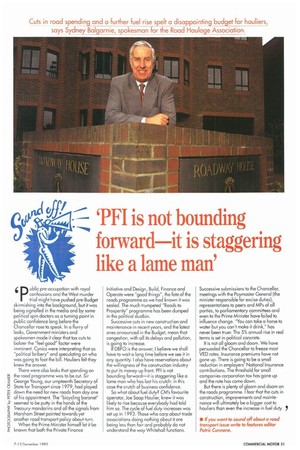'HI is not bounding forward it is staggering like a lame man'
Page 53

If you've noticed an error in this article please click here to report it so we can fix it.
6 ublic pre-occupation with royal
confessions and the West murder trial might have pushed pre-Budget skirmishing into the background, but it was being signalled in the media and by some political spin doctors as a turning point in public confidence long before the Chancellor rose to speak. In a flurry of leaks, Government ministers and spokesmen made it clear that tax cuts to bolster the "feel good" factor were imminent. Cynics were interpreting that as "political bribery" and speculating on who was going to foot the bill. Hauliers felt they knew the answer.
There were also leaks that spending on the road programme was to be cut. Sir George Young, our umpteenth Secretary of State for Transport since 1979, had played down the need for new roads from day one of his appointment. The "bicycling baronet" seemed to be putty in the hands of the Treasury mandarins and all the signals from Marsham Street pointed towards yet another road transport policy about-turn. When the Prime Minister himself let it be known that both the Private Finance Initiative and Design, Build, Finance and Operate were "good things", the fate of the roads programme as we had known it was sealed. The much trumpeted "Roads to Prosperity" programme has been dumped in the political dustbin.
Successive cuts in new construction and maintenance in recent years, and the latest ones announced in the Budget, mean that congestion, with all its delays and pollution, is going to increase. If DBFO is the answer, I believe we shall have to wait a long time before we see it in any quantity. I also have reservations about the willingness of the construction industry to put its money up front. PFI is not bounding forward—it is staggering like a lame man who has lost his crutch: in this case the crutch of business confidence.
So what about fuel duty? CArfs favourite operator, Joe Soap Haulier, knew it was likely to rise because everybody had told him so. The cycle of fuel duty increases was set up in 1993. Those who carp about trade associations doing nothing about it are being less than fair and probably do not understand the way Whitehall functions. Successive submissions to the Chancellor, meetings with the Paymaster General (the minister responsible for excise duties), representations to peers and MPs of all parties, to parliamentary committees and even to the Prime Minister have failed to influence change. "You can take a horse to water but you can't make it drink," has never been truer. The 5% annual rise in real terms is set in political concrete. It is not all gloom and doom. We have persuaded the Chancellor to freeze most VED rates. Insurance premiums have not gone up. There is going to be a small reduction in employers' National Insurance contributions. The threshold for small companies corporation tax has gone up and the rate has come down.
But there is plenty of gloom and doom on the roads programme. I fear that the cuts in construction, improvements and maintenance will ultimately be a bigger cost to hauliers than even the increase in fuel duty.












































































































